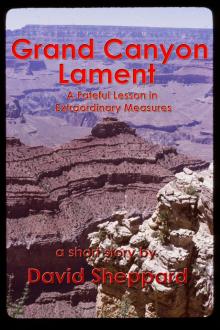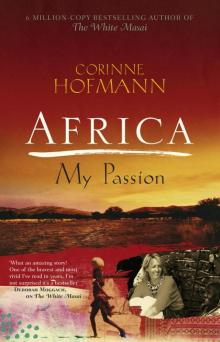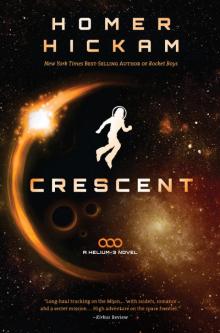Grand Canyon Lament, A Fateful Lesson in Extraordinary Measures


Author: David Sheppard
Category: Memoir
Published: 2013
Series:
View: 236
Read OnlineI wrote this short story for a class in intermediate fiction at the University of Colorado back in 1987 after reading a short story by John Ashbery titled, "Description of a Masque." I wrote it during the spring semester and just before I attended the Aspin Writers Conference, a life-altering event for me.You are blind and standing at the south rim of the Canyon. Gently and with kind words, as if performing a long overdue service for a patient of some convalescent hospital, he takes the cane from you, and you listen to the dull clunk of wood as he leans it against a rock. You learn that place, knowing you may have to return to it alone. The heat of midday sun is on your head, and you wish to see the wall of the north rim, realizing that the image can be nothing more than a mental fabrication. He returns, encourages you to stand a little closer to the edge. "To see," he says, "if you can sense what she must have — the ground plunge downward to the first plateau." He solicits more courage, urging you ahead, creating a comforting, therapeutic confidence in your action. "Don't be so timid. That's where they found her, you know, on the first plateau more than 2,000 feet below, which now has a thin covering of desert grass, just enough to give it a tinge of green. That's where she stopped."This world is a stranger to you, to both of you. But with the untimeliness of her passing, you must take extraordinary measures. And surely, it was your fault. You, who see even the fall of the least sparrow, failed to see the fall of your only daughter, the Little One. And so you are here. And since you refuse to discuss it, he treats it as amnesia. You feel strange standing on the very spot where the accident occurred. It was a very human event, simply a death.Now taking his suggestion, you lean, tentatively at first, then take a short step, feeling the ground gently slope off, the gravel move under your feet. Knowing he's close, you touch the thick hair and flesh of his arm, then feel him move from you, slightly back but still in touch, leaving you a little unsteady. An updraft rushes by, and then you detect a difference, an absence of reflected sound, a void in front of you as deep as that left in the heart from a sudden death. You yearn to cry out, to bounce an echo from the far wall, to make the abyss finite, to make it part of the Canyon. Instead, from within it comes the wordless cry of a human voice, a sound so strange, yet so complete in intent, young and old at the same time like that of a reincarnated child, lost and doomed to walk the face of the earth as an unaging spirit. "Do you hear that?" you ask. "Do you hear the voice from the Canyon?""I hear nothing but someone on horseback hurrying away on the dirt path and the occasional caw of a crow." His voice is now stiff and unconvincing. "If I try to listen with the ears of the blind, I hear the claws of squirrels in the trees behind us and just now the sound of children's laughter around the bend. But if I can't hear it, perhaps it is she calling you. Perhaps it would be only fitting for you to follow.""No. This is nothing like that. It comes from below. Maybe a climber stranded on a cliff," you lie. "There. I hear it again. It comes on the updraft."He leaves your touch and moves away from the edge as if seeking some strategic position. You hear him behind you, shuffling among the rocks, and you wonder if he's moving your cane. You wish to feel the tip on the ground, rake it from side to side, feel the dirt and push around loose rocks. You reach out in front as if with cane in hand, the other arm out to the side for balance. He's talking to you again, his voice subtly changed, hardly disguising an air of inquisition, asking if you remember being here, asking if the presence of the Canyon is somewhat familiar? Is it filtering through your darkness? He's close behind you, too close. "In the past, your eyes would have filled with a palette of colors, painting," he suggests, "the layered rim that cuts off the blue sky and the strata that goes from dirt-pink to chalk-white to rust, and the cliffs that fall away to the green valley and the river below."
 Chinese Cinderella and the Secret Dragon Society
Chinese Cinderella and the Secret Dragon Society Marley and Me: Life and Love With the World's Worst Dog
Marley and Me: Life and Love With the World's Worst Dog Famous
Famous Pornografia
Pornografia Africa, My Passion
Africa, My Passion I Love a Broad Margin to My Life
I Love a Broad Margin to My Life Johnny Cash: The Life
Johnny Cash: The Life Crescent
Crescent